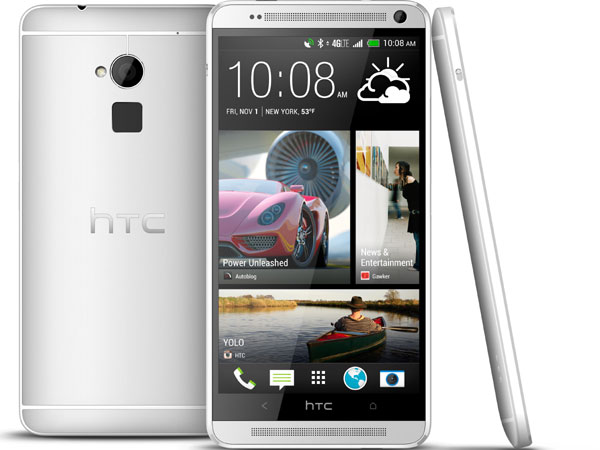
The new HTC One Max phone is seen in an undated photo provided by HTC Corp. The new HTC One Max will have one feature unavailable with the smaller models: a fingerprint identification sensor similar to that on Apple’s new iPhone 5S. It’s an optional way to unlock a phone without needing a four-digit passcode. AP
TAIPEI—Struggling Taiwanese phone manufacturer HTC launched its latest plus-sized handset in Beijing Tuesday, hoping to cash in on the fast-growing Chinese market where users are demanding increasingly larger screens.
The “One Max,” which boasts the widest display in the HTC family at 5.9-inches and a fingerprint scanner, is to be rolled out around the world from the middle of the month, the company said.
The device—which sits in the so-called “phablet” category where handsets are larger than average smartphones but smaller than tablets—will not receive its Taiwan or Unites States launch until later this week, although reporters in Taipei were briefed on the new device Tuesday.
A company spokesman would not comment on reports that publication of the phone’s specifications was brought forward 24 hours following a media leak.
Analysts said it was in China where the Taiwanese manufacturer hoped the One Max would prove popular as it struggles against its more popular rivals Samsung and Apple.
“It is reasonable that HTC is now giving priority to China as it is expected to emerge as the most fast-growing and biggest smartphone market in the world,” a senior industry analyst told AFP, speaking on condition of anonymity.
He was mindful of a pledge by HTC chairwoman Cher Wang to take a 20 percent share of China’s lucrative high-tier smartphone market by next year.
But the analyst predicted the amount of One Max handsets HTC is able to ship to China would not be high enough to significantly lift up the company’s fortunes.
According to research firm IDC, sales of smartphones in China could grow 25 percent in 2014 to 450 million units from a forecast 360 million for 2013.
Supersized handset
The phone’s large screen is part of a trend across high-end smartphone manufacturers to offer larger devices as consumers increasingly rely on the phones in their pockets to surf the Internet and watch movies.
“We’re introducing this supersized handset as users are changing their habits,” an HTC official, told reporters in Taipei.
The pricing structure for the handsets will be announced later this week, he said.
The new product, operating on an Android 4.3 platform, will also come equipped with a fingerprint scanner on the back of the device, the first time HTC has offered such a device.
Last month Apple offered a similar scanner on the front of its top-of-the range iPhone.
The HTC scanner will allow users to unlock their screen as well as swiftly launch up to three applications using three different fingers.
“This fingerprint scanner will enable users to swiftly access the gadget while ensuring an improved security feature,” the official said.
The move comes less than six months after its new flagship smartphone, the 4.7inch screen One was put on the market.
But the much-anticipated gadget has so far failed to come to the rescue of the company as it battles long-term rivals Apple and Samsung as well as China’s emerging brandnames such as Huawei.
HTC swung to a net loss of Tw$2.97 billion ($101 million) in the three months to September, compared with a net profit of Tw$3.9 billion a year ago. It made a net profit of Tw$1.25 billion in the second quarter.
The Taiwanese firm held a 4.6 percent share of the global smartphone market in 2012, sharply down from 8.8 percent a year earlier. Samsung held a 30.3 percent stake while Apple had 19.1 percent, according to research firm IDC.
As part of its efforts to boost sales, the company has planned a range of mid-tier smartphones later this year as analysts warn of waning demand for high-end gadgets.